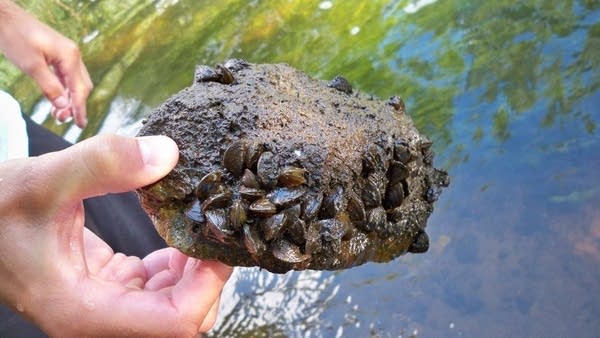DNR: Zebra mussels confirmed in White Bear, Waconia lakes

Zebra mussels have been found in White Bear Lake and Lake Waconia. Those popular Twin Cities lakes are now considered infested.
Biologists found three zebra mussels in Lake Waconia in Carver County and three in White Bear Lake, which straddles Ramsey and Washington counties, following reports from the public, the state Department of Natural Resources said Friday.
"In both Waconia and White Bear, the size and location of the zebra mussels found may suggest natural reproduction could be occurring," the DNR said. "In such cases, control efforts such as the chemical treatment recently tried on Christmas Lake in Shorewood would likely be ineffective."
The DNR will post signs about the infestation at both Lake Waconia and White Bear Lake.
Create a More Connected Minnesota
MPR News is your trusted resource for the news you need. With your support, MPR News brings accessible, courageous journalism and authentic conversation to everyone - free of paywalls and barriers. Your gift makes a difference.
• Map: See where zebra mussels have spread in Minnesota
It's been a bad year for Zebra mussel discoveries.
The DNR this summer confirmed zebra mussels in northwest Minnesota lakes, including popular Lake Melissa, near Detroit Lakes.
A few weeks ago, the DNR said it found the mussels in Cass Lake, one of the state's largest. It was the first time the invasive species has been confirmed in the Bemidji area. The DNR also designated connecting lakes and rivers around Cass Lake as infested.
More than 175 Minnesota lakes and rivers are now infested with zebra mussels, an invasive species that can push out native mussels. They can also cause more algae and weed growth — they filter the lake water, allowing sunlight to penetrate more deeply.
• Topic: Environment coverage
Zebra mussels attach to boats, making it easy for them to travel and contaminate other waters.
Boaters are required to clean their boats after leaving a lake to keep from transporting mussels that might attach to the boat hulls.
The DNR and county officials across Minnesota have been working this summer to beef up boat inspection and enforcement. Gov. Mark Dayton earlier this year signed legislation to distribute $10 million a year to local governments to fight the mussels and other aquatic invasive species.